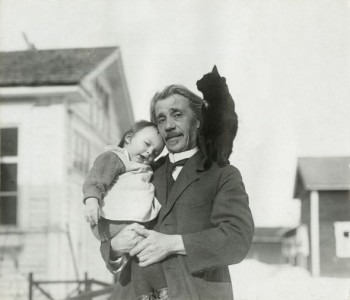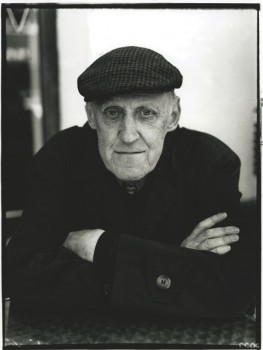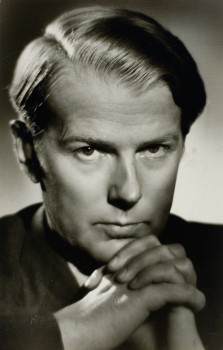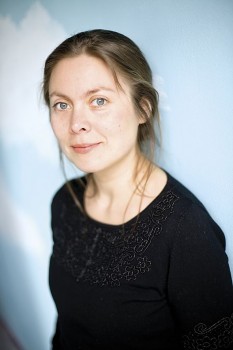Search results for "2010/05/song-without-words"
Poems
30 June 1982 | Archives online, Fiction, poetry
Introduction by George C. Schoolfield
The Cranes
Today the springtime shot its arrow point
into the winter’s heart:
the cranes’ crooked plow.
Today on the ice
the water splashed
half-a-yard high beneath the horse’s hooves –
may the magpie laugh cunningly
beside the ice-hole’s edge –
beneath the snow the earth growls
the hidden bodies of the trees cry:
the cranes the cranes!
From Taggiga lågor (‘Barbed flames’, 1924)
Hamlet in blue velvet
22 January 2010 | Fiction, poetry
Physical, mythical, sensual, playful: Sirkka Turkka’s poems, never abstract, speak of life, death, dogs, horses, nature and humans. In her universe the humorous and the grave socialise without effort. These texts, in prose form, with Hamlet as one of the characters, are often set in a wintry landscape (see Nature girl)
Poems from Yö aukeaa kuin vilja (‘The night opens like corn’, Tammi, 1978)
Of his early childhood, Hamlet really only remembered his father’s slightly crooked and gnarled index finger, pointing at the lowest branch of a holly oak. A small owl sat on it. It can’t see anything, it’s asleep now. It won’t fly off until night. These were the only words Hamlet remembered his father saying to him during the first six years of his life. Later, all he saw of his father was his back, bent over in study of agricultural conditions in a village called Jawohl or of waterside traffic on the river Vistula at the turn of a particular century. When it came to governmental matters, the king placed his trust chiefly in his unconscious and in wheat bread, thick white slices of which he devoured from the moment he awoke. More…
Me and my shadow
Hotel Sapiens is a place where people are made to take refuge from the world that no longer is habitable to them; the world economy has fallen – like the House of Usher, in Edgar Allan Poe’s story – and with it, most of what is called a civilised society. A rapid synthetic evolution has taken humankind by surprise, and the world is now governed by inhuman entities called the Guardians. ‘Kuin astuisitte aurinkoon’ (‘As if stepping into the sun’) is a chapter from the novel Hotel Sapiens ja muita irrationaalisia kertomuksia (‘Hotel Sapiens and other irrational tales’, Teos, 2012), where several narrators tell their stories
The fog banks have dissipated; the sky is empty. I cannot see the sails or swells in its heights, nor the golden cathedrals or teetering towers. I would not have believed I could miss a fog bank, but that’s exactly what it’s like: its disappearance is making me uneasy. For all its flimsiness and perforations it was our protection, our shield against the sun’s fire and the stars’ stings. Now the relentlessly blazing sun has awakened colours and extracted shadows from their hiding places. The moist warmth has dried into heat and the Flower Seller’s herb spirals have dried up into skeletons. The leaves on the trees are full of bronze, sickly red and black spots. Though there is no wind and autumn is not yet here, they come loose as if of their own volition, as if they wanted to die.
This morning, as I was strolling up and down the park path as usual, I saw another shadow alongside my own.
– Ah, you’re back! I said. – I wondered what had happened to you after you lost your shadow; how did you manage to change into your own shadow yourself? More…
Poems
31 December 1985 | Archives online, Fiction, poetry
Introduction by George C. Schoolfield
Birds of passage
Ye fleet little guests of a foreign domain,
When seek ye the land of your fathers again?
When hid in your valley
The windflowers waken,
And water flows freely
The alders to quicken,
Then soaring and tossing
They wing their way through;
None shows them the crossing
Through measureless blue,
Yet find it they do.
Unerring they find it: the Northland renewed,
Where springtime awaits them with shelter and food,
Where freshet-melt quenches
The thirst of their flying,
And pines’ rocking branches
Of pleasures are sighing,
Where dreaming is fitting
While night is like day,
And love means forgetting
At song and at play
That long was the way. More…
Taken by surprise
In her fifth collection of poems, Pauliina Haasjoki explores night flights, water, islands, sandy beaches where time is found stratified in stones and fossils. Interview by Teemu Manninen
Poems from Aallonmurtaja (‘Breakwater’, Otava, 2011)
Night flight
Man cannot hide in the night, his desire will betray him.
Man turns toward the lights, light sparkles as though it were close at hand
even if it is far away.
Lights, which offer themselves like jewels to the one who sits in the plane above them, are already
in their viewers’
eyes even if they have only just begun to stream from their source. A city-jewel swaying
in the black night air.
A solitary light on the surface of an island. Seen close up it is a soft-lit lamp
which casts light only on the table and the faces around it,
but from above, at a distance of kilometres, it is an immediate spot, a straight line that
aims at the viewer
and pierces her. A fierce light-beam.
Moving on
30 June 2003 | Archives online, Fiction, Prose
Extracts from the short story ‘Tunnin kuvat’ (‘One-hour processing’, from the collection Vapiseva sydän, ‘Tremulous heart’, Tammi, 2002). Introduction by Harry Forsblom
Last summer, when I was helping my brother with his move, he said I could take as many of his old LPs as I wanted. There were actually two of us on the job: his younger friend Timbe was along, and when we’d almost completely cleared out the flat and my brother’s two cellar closets (he’d rented an extra closet from the next-door flat, as he was submerging under the clobber lying around everywhere), he said the same to Timbe: ‘Just help yourself.’ The records we ourselves didn’t want would be chucked in the rubbish.
In defence of small people
15 November 2012 | Non-fiction, Reviews

Teuvo Pakkala with grandson Teuvo-Pentti and Mirri the cat. Photo: F. Suomela / Otava, 1922
The best-known work of author Teuvo Pakkala (1862–1925) is Tukkijoella (‘On the log river’, 1899), Finland’s most-performed play. The song-studded comedy set in motion a phase of ‘logger romanticism’ in Finnish literature which later spread to film as well. Like the cowboy of the old west, the wandering lumberjack became the prototype for the Finnish masculine adventurer.
The entertaining musical play was a blockbuster. Pakkala’s works of more literary significance, however, encountered more difficulty. His short story collections on the lives of children – Lapsia (‘Children’, 1895) and Pikku ihmisiä (‘Little people’, 1913) – were greeted with flattering acclaim, but marked the author as hopelessly ‘effeminate’, as the critics put it. The stories were read as a kind of child-rearing guide, or even as tales for children. It wasn’t until much later, in the second half of the 20th century, that these psychological studies of children were re-examined as early gems of the short story form by a contemporary of Freud. More…
The gender of the soul
Scenes from the play Kuningatar K / Queen C
Characters:
Christina, the Queen
Friend
The Queen Mother
Karl Gustav, the Count [Christina’s suitor, the King-to-be]
Descartes, philosopher
Official
Man
The King
Oxenstierna, Per Brahe
A choir of midwives
The play can be performed with six actors (3 female, 3 male). Other ways of dividing the roles are possible. All stage directions may be altered.
1. Prologue
The eels’ court
CHRISTINA
If eels had a court then a great female eel would sit in the centre and the little males would writhe about like seaweed around the throne. However they would not be envious of the queen, because they would know that if they swam up into rivers and lakes, into fresh waters, they themselves would gradually become females, great and heavy, and would be able to rule and close into their great embrace all the small little gentlemen. They just have to wait.
KARL GUSTAV
I don’t know. What I do know is that a great black eel, as thick as a rope, was pulled out of the well last night and the Queen looked at its silver stomach and its thrashing tail, but the eel looked the Queen in the eyes and in the heart and since then she has never been the same. More…
On the bridge
30 June 1993 | Archives online, Fiction, Prose
From Saksalainen sikakoira (‘Schweinehund’, WSOY, 1992). Introduction by Tuva Korsström
From somewhere beneath the bridge – I still hadn’t managed to get across it, which may sound pathetic, or even ridiculous, unless you take into account my exceptional state of mind – or, rather, to one side, I heard a dragging, ominous grinding and rumbling. It stopped for a moment; then, after a short but clearly defined pause, there was a heavy splash. A snow-plough was emptying its load into the bay from the end of the pier. The mounds of snow sank deep into the black water; the tightly packed, sticky snow rose slowly to the surface in greyish-yellow blocks and clods; loose pieces of snow boiled and foamed in the eddies and melted before my eyes. My time was melting away, too, being junked, my remaining time… More…
The engineer’s story
30 June 1981 | Archives online, Fiction, Prose
A short story from Maailman kivisin paikka (‘The stoniest place in the world’, 1980). Introduction by Pekka Tarkka
Coffee was going to be served down by the river. The engineer took my elbow and led me across his paved courtyard and over his lawn; we settled ourselves down in cane chairs under the trees. Mirja came out of the house with a tray of coffee and coffee-cups, a loaf of sweet bread, already cut, some marble cake and some biscuits. The engineer said nothing. My eye wandered over the ample weeping birches by the river, the mist creeping up in the cool of the evening and shifting in the cross-pull of the breeze and the current, and I watched Mirja moving under the trees back to the house and then down again to the riverbank.
As we sipped our coffee we spoke about chance, and the part it plays in life, about my husband – for I was able to speak about him now: enough time had gone by. The engineer eased himself into a comfortable position, gave me a quick look and then launched off into an account of his own, about his trip abroad:
I spotted the news item as I was going through the morning paper on the plane. I sat more or less speechless all of the first leg, listening to Kirsti and her husband confabulating. I didn’t say anything during the stop-over in Copenhagen, either, where they wanted to get some schnapps and, of course, some chocolate ‘if Kirsti would really like some’. We came rushing back into the plane just as the last English, German and Danish announcements were coming over, and then we sat waiting for the take-off. That was delayed too because of a check-up (not announced), and then we were off again for Zurich, me without a word and they whispering together. Then it was the bus as far as the terminal, and after that a taxi to the hotel. Quite clearly Kirsti hadn’t heard a thing about it yet, and probably hadn’t had much contact with Erkki for quite some time, her new husband even less. More…
Asking for more
14 April 2010 | Fiction, poetry
The heroines in Vilja-Tuulia Huotarinen’s new collection, Iloisen lehmän runot (‘Happy cow poems’, 2009), are timeless creatures, mythical and archaic, and yet our contemporaries, living their lives alongside us (see Ruminations)
Let the cows out on Monday
and they’ll enter the forest, wander far
aim for the waterfalls, the hole in the rock and down the precipice.
The dead come back along our the road to our yard:
Rebecca, Isolde, Rosamunda.
Allison, Eulalia, Euphrosyne.
Not as ghosts but as old friends.
Whom will they, the wingless ones, protect here?
A lean lass, a lean lass. More…
The summer of 1965
30 June 1995 | Archives online, Fiction, Prose
From Underbara kvinnor vid vatten (‘Wonderful Women by the Sea’, Söderströms, 1994; Finnish translation lhanat naiset rannalla, Otava, 1995). Introduction by Michel Ekman
The summer of 1965; this summer people go waterskiing. They go waterskiing behind the Lindberghs’ shining mahogany sportsboat, and from midsummer onwards they go water-skiing behind Gabbe’s outboard motorboat, an Evinrude bought second-hand from Robin Lindbergh. Now Bella and Rosa are skiing: Tupsu Lindbergh’s face is covered in freckles if you look at her close to, and it’s not particularly becoming, her fair hair is super-peroxided and she is as thin as a skeleton and everyone knows that it’s because she is so thin and ugly and not because she has a cold that she says she can’t take part in any watersports. There is something nervous about Tupsu Lindbergh. At Bella’s party at the beginning of the summer Tupsu Lindbergh sits on the white villa’s veranda, on the white villa’s lawn on a camping chair, on the white villa’s beach while Bella and Rosa go waterskiing and talk about Tupperware. Not Tupperware all the time, but Tupperware is the collective description. More…



